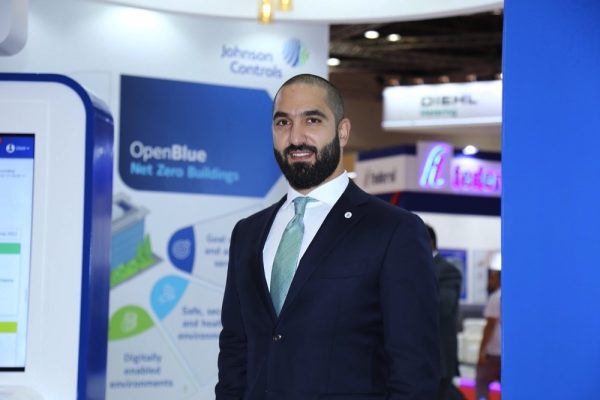By: Mohammad Saqan – strategic accounts director – MEA, Johnson Controls
Dubai, UAE, 30 March 2023: Countries and companies all over the world are taking rapid responsibility to cut carbon emissions, and the hotel and hospitality industry is not far behind. A survey from Tripadvisor states that tourists are taking action themselves. 62% of travelers are opting for more environmentally friendly hotels, food, and transportation and 69% said they intended to make even more environmentally responsible travel choices in the future.
With tourists and travelers taking steps themselves, what does this mean for the hotel and hospitality sector? Hospitality firms are also implementing sustainable initiatives and operational practices to reduce their carbon footprints and conserve critical natural resources. Many of these firms are focusing on modifying operational processes such as proactively reducing energy, lighting, and water usage, as well as optimizing climate control through environmental friendly HVAC systems.

A positive consequence of these sustainable operational initiatives is the improved cost savings and overall profitability for the sector. A study by Forrester Research Inc. indicates that hospitality companies that implement sustainable HVAC and other day to day operations have realized benefits in areas such as improved efficiency (83%), regulatory compliance (76%), ability to attract guests/guest loyalty (75%), employee recruitment and retention (72%), and revenue growth (58%).
HVAC systems are the key drivers for carbon emissions in hospitality sector. According to an industry report, HVAC systems in hotels are known to emit over 3.47 mega tonnes of carbon emissions annually and consume over 40% of a building’s total energy consumption. Given this, the potential to enhance energy efficiency in hotels is huge through efficient solutions.
As such, several players in the field are now deploying smart and sustainable solutions that improve every aspect of the operation: modernizing the equipment and systems in the facilities, deploying technology that increases productivity, optimizing entire water utility, and implementing renewable energy systems to cut carbon emissions. Most of them opt Johnson Controls portfolio of HVAC equipment that not only offers efficient, reliable climate control, but also deliver cost-effective comfort and sustainable efficiency. YORK® chillers from Johnson Controls offer the efficiency and intelligence to reduce energy consumption and emissions, while creating a more comfortable and sustainable building environment. Their air-cooled chillers, water-cooled chillers, condensing units and absorption chillers provide ambient temperature conditions and cut energy costs.
While hospitality is doing its best to cut carbon emissions, healthcare sector is also leading the march with its innovative strategies to achieve Net Zero Goals.
On a global average basis, healthcare systems account for over 4% of global CO2 emissions. For most industrialized nations, that figure is closer to 10% of national emissions. As such, demand for the healthcare industry to improve environmental sustainability, address net-zero carbon emissions goals, and enhance building operations efficiency is growing. Healthcare decision-makers are starting to understand that making sustainability an organizational priority is not just a compliance requirement — it’s a competitive differentiator for their organization. According to Forrester Research Inc, healthcare organizations that have implemented sustainable solutions have realized benefits across many areas of their business operations. The top benefits include reduced waste (87%), improved regulatory compliance (87%), improved efficiency (87%), and improved staff recruitment and retention (83%).
As healthcare organizations become more responsible, several of them are now adopting environmentally friendly measures including green building design, climate-controlled HVAC systems, use of clean and renewable energy, and more. Also, a lot of them are maximizing the share of clean heat and switching to a fully electric vehicle fleet, innovating in drugs, developing next-generation products that can reduce carbon emissions.
Several healthcare facilities also rely on Johnson Controls to deliver quality patient care without compromising on clinical outcomes and operational efficiency. Aa Master Systems Integrator, Johnson Controls build solutions based on the organization’s needs. Their proven approach and the use of data-enabled solutions have helped healthcare organizations create healing environments that respond to the needs of patients, staff, and visitors.
In summary, planning strategically about sustainability and investing in energy efficiency can help healthcare and hospitality industry reach their goals of optimizing facility operations improving the patient experience, and promoting their business.
About Johnson Controls:
At Johnson Controls (NYSE:JCI), we transform the environments where people live, work, learn and play. As the global leader in smart, healthy and sustainable buildings, our mission is to reimagine the performance of buildings to serve people, places and the planet.
Building on a proud history of nearly 140 years of innovation, we deliver the blueprint of the future for industries such as healthcare, schools, data centers, airports, stadiums, manufacturing and beyond through OpenBlue, our comprehensive digital offering.
Today, with a global team of 100,000 experts in more than 150 countries, Johnson Controls offers the world`s largest portfolio of building technology and software as well as service solutions from some of the most trusted names in the industry.
























